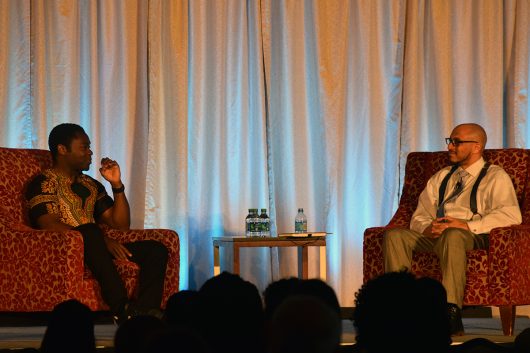
Actor David Oyelowo is interviewed by Hasan Kwame Jeffries. Credit: Emily Hetterscheidt | Lantern reporter
David Oyelowo, known for his role as Martin Luther King Jr. in “Selma,” spoke to students and faculty about acting and issues of diversity in Hollywood at the Ohio Union on Sunday.
The actor was born in the United Kingdom, grew up in both Nigeria and London, and moved to the U.S. in 2007. The issue of his own diverse background was a big topic throughout the discussion.
“The great thing for me is that I’ve had a very great cultural history,” Oyelowo said.
Oyelowo said he attended the London Academy of Music and Dramatic Art after being introduced to theater through his pastor’s daughter. He also talked about the differences between peforming for the stage and for film.
“It’s a medium that elicits a bigger degree of performance that if you were to do that for the screen you would blow people out of their chairs,” Oyelowo said.
Oyelowo also discussed the changes and challenges that are happening in the movie industry. He said when Barack Obama was elected as president, people were trying to gain context and understand African-American history.
Oyelowo said his varying roles in “Selma,” “The Butler” and “Queen of Katwe” gave him insight into his own ancestors’ history.
“In those films I literally got an education as to what it is to be an African American marginalized,” Oyelowo said.
The talk, organized by the Ohio Union Activities Board, was set up in an interview style with Hasan Kwame Jeffries, associate professor in history at OSU.
“It’s clear in looking at your work that this isn’t a job, it’s a passion,” Jeffries said to Oyelowo during the talk.
Audience members were invited to ask Oyelowo questions after the talk, which led to a discussion about the portrayal of Africa in Hollywood.
Oyelowo said there is a disconnect between African Americans and the characters they see portrayed on stage because cultures are often not portrayed correctly.
“Every society that has wanted to steal denigrate, steal from, marginalize another culture, the way to do that is make that culture seem lesser than yours,” he said.
One of the project leads on this event, Kamaria Thomas, a third-year in sociology and women’s, gender and sexuality studies, said it was important for someone like Oyelowo to speak on issues of social justice as they relate to the arts.
“I think it was important for somebody of that status to come because college students are more easily able to relate to somebody that they see all the time and that they are familiarized with,” Thomas said.


